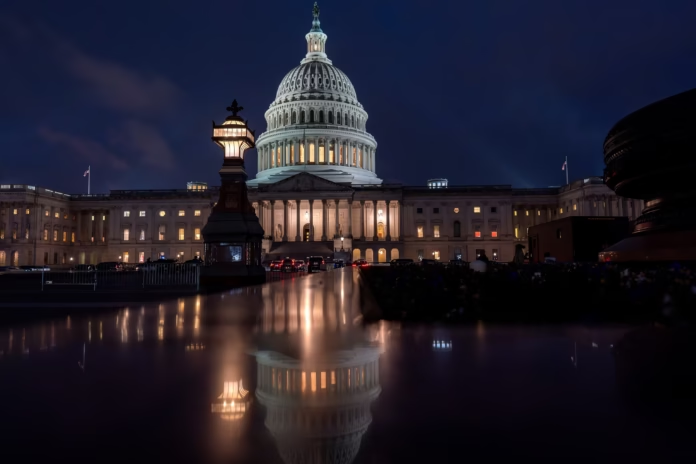Congressional negotiators have introduced a bill aimed at preventing a partial government shutdown during the initial 100 days of President Donald Trump’s term.
The 99-page legislation would generally uphold current government funding levels through the start of fiscal year (FY) 2026, beginning on October 1. The existing deadline to avoid a shutdown is Friday, March 14.
House Republican leaders believe they can pass the bill with support from their own party, a feat they have not achieved since assuming the chamber majority in January 2023.
During a Saturday morning briefing, House Republican leadership aides noted that the bill was developed in coordination with the White House. However, they stopped short of confirming full support from President Trump, indicating he has yet to review its full content. The measure allocates an additional $8 billion for defense spending, seemingly to address concerns from national security advocates, while reducing non-defense discretionary spending by about $13 billion.
The bill also includes $6 billion for veterans’ healthcare. Additionally, the White House requested extra funding for select priorities absent in the previous funding extension, referred to as “anomalies.”
One such anomaly is increased funding for Immigration and Customs Enforcement (ICE), which aides indicated addresses an “operations shortfall” linked to the previous administration. According to a source, most of that funding had already been committed before the current administration took office, making the request necessary to cover an existing gap.
The bill follows spending limits established by the Fiscal Responsibility Act (FRA), which capped federal spending growth at 1% in FY 2025. To achieve reductions in non-defense discretionary spending, negotiators proposed eliminating certain “side deals” made during previous FRA discussions. Additionally, lawmakers would be prevented from requesting funds for localized projects, known as earmarks, which Republicans classified as cost savings.
In total, the bill outlines $892.5 billion for discretionary defense spending and $708 billion for non-defense discretionary funding. Discretionary spending represents funds allocated annually by Congress, in contrast to mandatory spending obligations such as Medicare, Medicaid, and Social Security.
This bill functions as a continuing resolution (CR), which extends the previous fiscal year’s funding levels and priorities rather than implementing new appropriations. It would be the third and final CR extending FY 2024 funding through the conclusion of FY 2025. Republicans argue this strategy positions them advantageously to advocate for conservative funding priorities before the next fiscal year begins on October 1.
The two prior funding extensions occurred under the previous administration, when Democrats controlled the Senate. While House Democrats have historically voted to prevent government shutdowns, current Democratic leaders are urging opposition to this Republican-driven CR.
In a recent statement to colleagues, House Democratic leaders claimed the CR threatens funding for healthcare, nutritional support, and veterans’ benefits through the fiscal year’s end. They asserted that while they would back a bill safeguarding Social Security, Medicare, Medicaid, and veterans’ healthcare, the proposed measure jeopardizes these programs to accommodate tax cuts for the wealthy.
For more political updates, visit, DC Brief.


